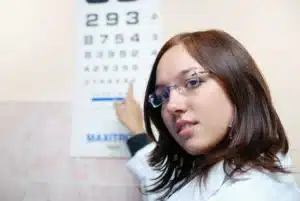Glaucoma is a very common eye disease that’s characterized by damage to the optic nerve – which is located in the back of each eye. The optic nerve is a network of more than a million tiny nerve fibers that connect the retina (back of the eye) to the brain. Together, the brain and the retina produce an image.
There are three primary types of glaucoma:
Open-Angle Glaucoma – the most common type of glaucoma, primary open-angle glaucoma occurs when the eye’s drainage angles become clogged, resulting in an increase in eye pressure.
Angle-Closure Glaucoma – also known as narrow-angle glaucoma, angle-closure glaucoma occurs fluid drainage is obstructed due to a closed angle between the iris and cornea.
Normal-Tension Glaucoma – also known as low-tension glaucoma, normal-tension glaucoma is characterized by damage to the optic nerve, despite a low or normal eye pressure.
Glaucoma is caused by an increase in intraocular pressure (pressure inside the eye), which is usually a result of aqueous humor (fluid inside the front part of the eye) not draining properly – much like a clogged drain. The eye pressure starts to increase once the fluid builds up in the eye, which can impact vision.

How Does Glaucoma Affect Vision?
A patient’s experience with glaucoma largely depends on the type of glaucoma they’re diagnosed with. For example, open-angle glaucoma is a ‘silent disease’ that usually presents no symptoms in its early stages, while angle-closure glaucoma is an actual medical emergency that requires immediate attention.
Here are some of the most common symptoms of angle-closure glaucoma:
- Blurred vision
- Severe eye pain
- Headaches
- Nausea, upset stomach, vomiting
- Rainbow-colored rings in visual field
- Seeing halos around lights
- Eye redness
Most people with open-angle glaucoma aren’t going to notice any changes to their vision, but those with angle-closure glaucoma will almost always experience immediate changes to their vision. And since damage can’t be reversed (even with surgery), it’s important that patients seek treatment right away.
Does Glaucoma Cause Blindness?
Glaucoma won’t always result in blindness, but it’s certainly possible – in fact, it’s the second-leading cause of blindness in the world, according to the World Health Organization (WHO). Current estimates suggest that roughly 80 million people in the world suffer from one of the three primary types of glaucoma.
And while roughly three million Americans have the disease, only about half of them know they have it and more than 120,000 of them are blind as a result – which accounts for nearly 10% of blindness in the United States. Even those that don’t go blind will likely experience some sort of vision loss with glaucoma.
With that said, most people will experience a loss of peripheral vision (side vision) before they start to lose central vision – which is a major reason why it goes unnoticed until its later stages. With quality treatment and a dedication to eye health, glaucoma patients can safely and effectively reduce the risk of going blind.

How Do You Treat Glaucoma?
As of today, there is no known cure for glaucoma and, while treatment does exist, we currently have no way of reversing any damage already done to the optic nerve. With that said, the technology we have today gives glaucoma patients a number of options to consider when seeking treatment for the disease.
Most treatment plans include a combination of medication, laser surgery, and operating room surgery – let’s take a closer look:
- Eyedrop Medication – doctors give patients prescription eye drops to either reduce the amount of fluid the eye produces or help fluid flow through the drainage angle properly.
- Laser Surgery – normally done on an outpatient basis, doctors might suggest undergoing either a trabeculoplasty or iridotomy, both of which help fluid flow through the drainage angle properly.
- Operating Room Surgery – more severe cases might require a trabeculectomy, a glaucoma drainage implant, or even cataract surgery to help normalize intraocular pressure.
The primary goal behind glaucoma treatment is lowering the eye’s intraocular pressure – which can be done in a multitude of ways, depending on each patient’s unique needs. Having an open dialogue with your doctor will help them navigate your options and ensure you’re given the right treatment plan.

How to Prevent Glaucoma
The best way to prevent glaucoma is by scheduling regular eye exams with your doctor – preferably once per year, unless directed otherwise. While most people won’t experience any symptoms in the early stages of glaucoma, an eye exam can detect glaucoma before it becomes a major problem for the eye.
During the comprehensive exam, your ophthalmologist will measure eye pressure, inspect the drainage angle, examine the optic nerve for damage, test peripheral vision, take a photo of the optic nerve, and measure corneal thickness. Once optic nerve damage is found, the doctor will diagnose it as glaucoma.
Here are some other things you can start doing today to prevent glaucoma and optic nerve damage, in general:
- Make sure you schedule a comprehensive dilated eye exam with your doctor regularly
- Make sure you understand your family’s eye health history
- Maintain a healthy weight and engage in physical activity regularly
- Control your blood pressure and avoid smoking tobacco
- Eat a healthy, well-balanced diet and avoid processed foods
- Always wear protective eyewear whenever necessary (playing sports, DIY activities, etc.)
- Wear sunglasses when in direct sunlight and make sure they offer 100% UV protection from all UV light (both UVA and UVB)
- Keep an open dialogue with your eye doctor and follow their directions carefully
Are you at an increased risk of glaucoma? Are you starting to experience a loss of peripheral vision? Have you recently been diagnosed with ocular hypertension? Has it been more than 12 months since your last eye doctor appointment? If you answered ‘yes’ to any of those questions, contact us right away!
At Milwaukee Eye Surgeons, we understand how important eye health is to your day-to-day routine and are dedicated to ensuring every patient is met with quality care and even better treatment. To schedule an appointment with Dr. Kenneth Weinlander, MD, call us at (414) 377-5550 or book an appointment online!


